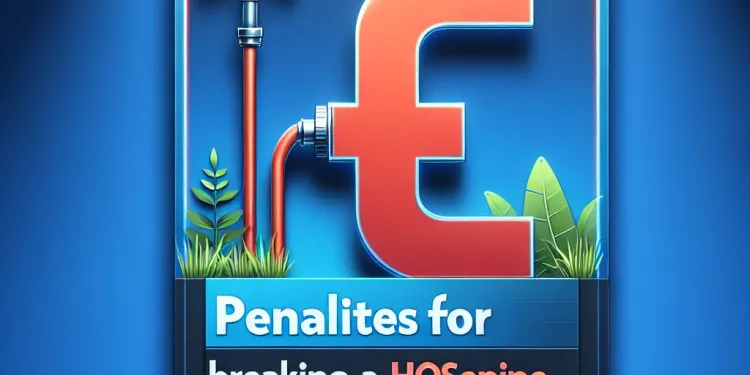
Find A Professional
Introduction to Hosepipe Bans
In the UK, hosepipe bans, also known as temporary use bans, are restrictions implemented by water companies during periods of water scarcity. These measures are designed to conserve water resources when the demand exceeds the supply, often during prolonged dry spells or droughts. The bans usually cover the use of hosepipes and sprinklers for activities such as watering gardens, washing cars, and filling paddling pools. Understanding the penalties for violating these bans is crucial for residents to avoid fines and help preserve essential water resources.
Legal Framework
Hosepipe bans are covered under the Water Industry Act 1991, which allows water companies to impose restrictions when necessary. The statutory instrument used to enforce these bans was updated by the Flood and Water Management Act 2010, which broadened the scope of activities that could be restricted. Water companies have the legal authority to apply for such bans and are responsible for communicating the details to their customers, ensuring that residents are aware of the rules and the potential penalties for non-compliance.
Penalties for Non-Compliance
The penalties for breaking a hosepipe ban can be significant. If a person is found to be in violation of a hosepipe ban, they could face a fine of up to £1,000. The enforcement of these fines falls under the jurisdiction of local water companies, which have the power to take legal action against offenders. Offenders are usually given warnings initially, but repeated or blatant violations can lead to prosecution and a financial penalty imposed by the courts. It is worth noting that water companies may also impose additional measures, such as restricting water supply to specific areas, if compliance is not achieved through fines alone.
Enforcement and Monitoring
Monitoring compliance with hosepipe bans is challenging, as it requires a level of surveillance and reporting. Water companies rely on reports from the public and their own staff to identify breaches of the ban. Many residents are encouraged to report instances where they see others violating the restrictions, especially if it is an ongoing issue. While this system is mostly reliant on community engagement and voluntary compliance, the prospect of significant fines serves as a deterrent for potential violators.
Conclusion
The penalties for breaking a hosepipe ban in the UK are designed to discourage water wastage and protect vital water resources. With fines reaching up to £1,000, water companies and residents both play important roles in ensuring adherence to these temporary regulations. It is essential for residents to stay informed of the specifics of any hosepipe bans in their area and to follow the rules diligently, not only to avoid penalties but also to contribute to the sustainable management of the environment.
What is a Hosepipe Ban?
In the UK, sometimes we can't use too much water. This can happen when there is not enough rain and the water companies have to save water. So, they tell people they cannot use hosepipes. This is called a hosepipe ban. It means you cannot use a hose to water your garden, wash your car, or fill paddling pools. It is important to follow this rule so we do not waste water and can avoid paying money for not following the rules.
The Rules About Hosepipe Bans
The law says water companies can tell you not to use hosepipes if needed. This rule is part of the Water Industry Act from 1991. The rules changed a bit in 2010 to cover more things you can't do during a hosepipe ban. It is the job of the water companies to make sure everyone knows about the ban and what might happen if they don't follow it.
What Happens if You Break the Rules
If you use a hosepipe when you are not allowed, you might have to pay a lot of money. This fine can be up to £1,000. At first, you usually get a warning. But if you keep breaking the rules, you could have to go to court and pay the fine. Sometimes, if people do not listen, the water company may reduce the water supply in the area.
How Do They Check if You Follow the Rules?
It can be hard for water companies to see if people are breaking the ban. They rely on people to tell them if they see others breaking the rules. The community helps by reporting those who do not follow the ban. Knowing you might have to pay fines helps keep people from using their hosepipes during a ban.
Why It's Important
The fines and rules about hosepipe bans help us save water. Paying a £1,000 fine is a lot, so it's good to listen to the rules. Water companies tell us what to do, and people should help by following the bans. By doing this, we help take care of our environment and make sure there is enough water for everyone. Always check if there is a hosepipe ban in your area and make sure you follow the rules. It's good for everyone!
Frequently Asked Questions
Useful Links
- Ergsy carfully checks the information in the videos we provide here.
- Videos shown by Youtube after a video has completed, have NOT been reviewed by ERGSY.
- To view, click the arrow in centre of video.
- Most of the videos you find here will have subtitles and/or closed captions available.
- You may need to turn these on, and choose your preferred language.
- Go to the video you'd like to watch.
- If closed captions (CC) are available, settings will be visible on the bottom right of the video player.
- To turn on Captions, click settings .
- To turn off Captions, click settings again.